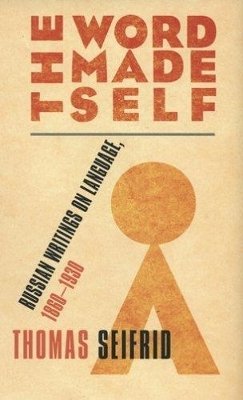
The Word Made Self: Russian Writings on Language, 1860–1930
Thomas J. Seifrid
When Osip Mandelstam wrote that the Russian word was "sentient and breathing flesh," he voiced one of the most powerful themes in his culture. In The Word Made Self, Thomas Seifrid explores this Russian fascination with the power of the word as expressed in the work of philosophers, theologians, and artists of the Silver Age and early Soviet period. He shows that their diverse works (poems, novels, philosophical and religious tracts) share an attempt to articulate "a model of selfhood within the phenomenon of language." The thinkers included in this book—among them Pavel Florenskii, Roman Jakobson, Aleksei Losev, and Gustav Shpet—frequently responded to the work of contemporary European philosophers even as they drew upon and revitalized powerful elements of early Russian religious thought. On Seifrid's view, this highly original body of writing about language was the essential context for the development of Russian Futurism, Formalism, and the work of Mikhail Bakhtin and the Soviet structuralists—movements and ideas whose influence has extended far beyond Russia and long past their years of efflorescence. This book will have a lasting impact among readers who will be fascinated to discover the richness of this long-suppressed chapter in the history of Russian culture.
Product Details
About Thomas J. Seifrid
Reviews for The Word Made Self: Russian Writings on Language, 1860–1930
Caryl Emerson, Princeton University "The Word Made Self is a fascinating study of the intersection of philosophy, linguistics and theology in the age of Russian Modernism. Thomas Seifrid provides a compelling introduction to and analysis of the works of Sergei Bulgakov, Pavel Florenskii, Aleksei Losev, Aleksandr Potebnia, and Gustav Shpet. He shows how the idea of language as a carrier of subjectivity was central to all these thinkers. He is particularly sensitive to the way they wove together philosophical strands from German Romanticism, the Orthodox tradition, and phenomenology. The arguments here will be of major interest to historians of the Soviet period, particularly those working with notions of Soviet subjectivity and contemporary concepts of ideology. The Word Made Self is also an invaluable resource for all scholars whose work deals with the Symbolist and Formalist movements."
Eric Naiman, University of California, Berkeley "The Word Made Self is the first comprehensive examination in English of the rich and multifarious body of discourses on language produced in Russia over a period of some seventy years, from the abolition of serfdom to the rise of Stalinism. Wide-ranging and sensitive to a variety of disciplines and writing practices from theology and philosophy to literary criticism, fiction, and psychology, Thomas Seifrid's book will become an important reference point in the field."
Galin Tihanov, Lancaster University
